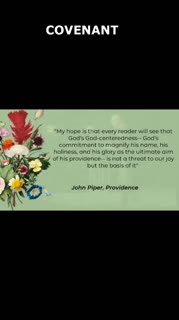Navigating Life Through Prayer, Providence, and Purpose
Devotional
Sermon Summary
Bible Study Guide
Sermon Clips
1. "Today, I want you to see God's providence. I want you to see it in three distinct ways. The first way I want you to see God's providence is actually through the relationships that you have today. The second way I want you to see God's providence as you follow along in your weekly, is this, is through circumstances. There's different circumstances each one of us have that we come in here today. I want you to see God's providence in that. The third way I want you to see God's providence through the book of Ruth in chapter 2, is actually if you're in a waiting period, which the people of God are always waiting on something, you actually see God's providence in that." [29:04] (35 seconds)
2. "When we think of God's providence, it can be defined as, Dr. Erickson, in the author of Christian Theology, which is a systematic theology text, he says this, he says that God's providence is the idea that God is present and active in the lives of Christians, and that people can live with confidence in the future. I want you to trust in God's providence. You can look to a future that you don't have to be scared of, you don't have to be anxious of, that God has his hands on the affairs of men. That's God's providence." [30:56] (32 seconds)
3. "When you think about the covenant -keeping God that's issued throughout the Old and New Testament, plainly seen in the gospel of Jesus Christ, that his providence, his rule, his love for you, and his sovereignty is no threat to your independence at all. That you should lean into it and enjoy it. God is not a killmonger. That God is trying to squish out your joy. But God has a plan. And we lean into that plan. And in this narrative, we get to see it played out in the book of Ruth in chapter 2." [34:14] (28 seconds)
4. "Friend, you may be looking for another life but let me tell you God's put you right where you are for a reason providentially he's put you right where you are for a reason I was not born in the 1800s if I were and I were born in the 1800s I would have been born in the 1800s I would have died of dysentery I mean that's just that's just my skill set I would have known how to build a house or anything I was born today at this place and so I live in today not wishing for something else or not wishing for God's hand in some other way but understanding and realizing that God's providential hand is here now the relationships I have are not by accident your relationships you have are not by accident treat them as so don't wish for something else watch the sovereign hand of God to stay in these relationships." [41:01] (48 seconds)
5. "How do you make a godly good decision that know that God is good with your decision? I have young people ask me this all the time. How do I know what to do? What college to go to? What person to marry? What's the next thing? How do I know how to do these things? How do I know how to walk in these things? I just give them some advice, three lenses to go through that. When you make a decision, make sure you're in scripture and what is God talking to you through your scripture? That's why being in the scripture each and every day is so important." [46:52] (27 seconds)
Ask a question about this sermon
2. "When we think of God's providence, it can be defined as, Dr. Erickson, in the author of Christian Theology, which is a systematic theology text, he says this, he says that God's providence is the idea that God is present and active in the lives of Christians, and that people can live with confidence in the future. I want you to trust in God's providence. You can look to a future that you don't have to be scared of, you don't have to be anxious of, that God has his hands on the affairs of men. That's God's providence." [30:56] (32 seconds)
3. "When you think about the covenant -keeping God that's issued throughout the Old and New Testament, plainly seen in the gospel of Jesus Christ, that his providence, his rule, his love for you, and his sovereignty is no threat to your independence at all. That you should lean into it and enjoy it. God is not a killmonger. That God is trying to squish out your joy. But God has a plan. And we lean into that plan. And in this narrative, we get to see it played out in the book of Ruth in chapter 2." [34:14] (28 seconds)
4. "Friend, you may be looking for another life but let me tell you God's put you right where you are for a reason providentially he's put you right where you are for a reason I was not born in the 1800s if I were and I were born in the 1800s I would have been born in the 1800s I would have died of dysentery I mean that's just that's just my skill set I would have known how to build a house or anything I was born today at this place and so I live in today not wishing for something else or not wishing for God's hand in some other way but understanding and realizing that God's providential hand is here now the relationships I have are not by accident your relationships you have are not by accident treat them as so don't wish for something else watch the sovereign hand of God to stay in these relationships." [41:01] (48 seconds)
5. "How do you make a godly good decision that know that God is good with your decision? I have young people ask me this all the time. How do I know what to do? What college to go to? What person to marry? What's the next thing? How do I know how to do these things? How do I know how to walk in these things? I just give them some advice, three lenses to go through that. When you make a decision, make sure you're in scripture and what is God talking to you through your scripture? That's why being in the scripture each and every day is so important." [46:52] (27 seconds)





